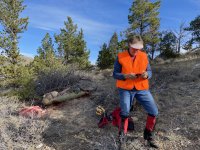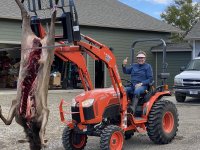Ed_Wischmeyer
Well Known Member
If you already know what TKA stands for, condolences -- it stands for Total Knee Arthroplasty, or knee replacement. Actually, I think that the "p" could be replaced with a "b" and it would be more descriptive. Mine was four weeks ago yesterday, right knee, and I'm just now getting strong enough to go places (as a passenger) and do things other than visit the PT clinic.
Previous preparations for first flight post-surgery included getting comfortable flying from both seats, and buying a little folding step stool -- a really great idea from VAF.
So this morning, I took my first drive. Once around the block, no traffic, slow and careful, in my Kia Stinger. About a quarter mile from home came the surprise, as my quads and glutes all started whimpering. Since the Stinger and the RV-9A seating positions aren't all that different, this means that I will also need to adjust to those seating positions. Fortunately, I've got two full months before planned departure to Oshkosh.
Today's good news is that I cut my Tylenol consumption to half of maximum daily dose. The bad news, one part of it, is that after the surgery, there are no days off from pain.
Previous preparations for first flight post-surgery included getting comfortable flying from both seats, and buying a little folding step stool -- a really great idea from VAF.
So this morning, I took my first drive. Once around the block, no traffic, slow and careful, in my Kia Stinger. About a quarter mile from home came the surprise, as my quads and glutes all started whimpering. Since the Stinger and the RV-9A seating positions aren't all that different, this means that I will also need to adjust to those seating positions. Fortunately, I've got two full months before planned departure to Oshkosh.
Today's good news is that I cut my Tylenol consumption to half of maximum daily dose. The bad news, one part of it, is that after the surgery, there are no days off from pain.







